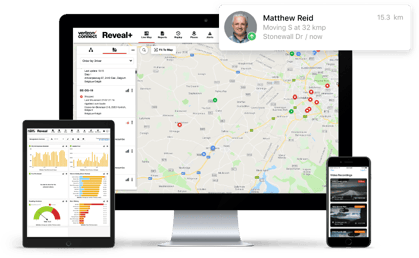9 Secrets to Reducing Fleet Expenses
As a fleet owner, your day-to-day costs can quickly add up. What you don’t know is there are further hidden, expensive...
Read more
When it comes to summarising the many reasons to implement GPS tracking, it’s only natural that some benefits take precedence over others. The ability of fleet tracking to help business owners lower fuel costs, spot areas of inefficiency and promote safer, more economical driving behaviours are always going to take the plaudits. And so they should.
Beneath these attention-grabbing benefits, however, are many more. All of which also have the potential to help businesses drive safety, productivity and efficiency. It’s time these lesser known benefits got the attention they deserved too. With that in mind, here are four you may not be aware of:
The less time you spend on paperwork, the more profitable you can potentially make every job. GPS fleet tracking can help you do this. As all relevant fleet information is stored in one single, web-based portal, your teams have access to the information they need, when they need it, without having to send documents back and forth. Data collected on driver start/ finish time and on-site arrival/departure time can also be used to automate key process such as timesheets, payroll and billing.
Data gathered by a GPS solution on driver behaviour, such as speeding, aggressive acceleration, harsh braking and seat belt use can not only be used retroactively to coach staff into safer habits, it can be leveraged proactively too. With audible in-cab alerts, drivers can be immediately warned as soon as unsafe driving practices occur, allowing them to correct behaviour almost right away.
Find the right solution for your business with our free Fleet Management Buyer’s Guide.
Vehicle tracking has the potential to extend the life of your fleet vehicles in several ways. Data collected on driving style, including instances of idling and harsh braking can be used to train drivers out of such habits, reducing wear and tear on vehicles. Location data and geofences can be used to minimise additional mileage that occurs because of personal use. Also, alerts can be set based on date, mileage or engine-on hours to allow for proactive maintenance and part replacement.
Optimised routing and near real-time location tracking allows fleet businesses to update their customers with more accurate, and up-to-date ETAs. Many comprehensive solutions even allow for the sharing of location data directly with customers, so they can track their assigned driver in near real-time.
Request a demo to see all the pros of vehicle tracking in action.
Tags: Cost control, Customer service, Data & analytics, Dispatching & scheduling, Payroll, Productivity & efficiency, Safety, Team management




Find out how our platform gives you the visibility you need to get more done.
As a fleet owner, your day-to-day costs can quickly add up. What you don’t know is there are further hidden, expensive...
Read moreVerizon Connect Reveal tracks the fleet data that can have a big impact on your business. These are things like where...
Read moreReveal tracks the fleet data that can have a big impact on your business. These are things like where your vehicles are...
Read moreWork smarter from quote to completion with an end-to-end fleet management solution...
Read more